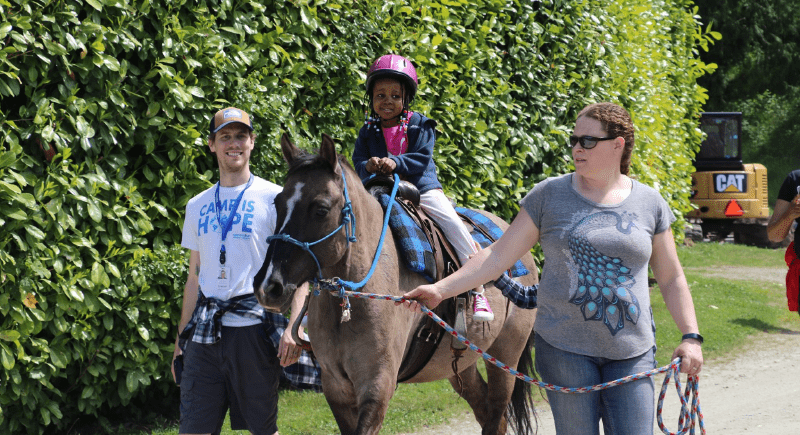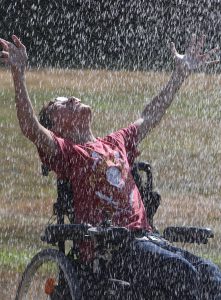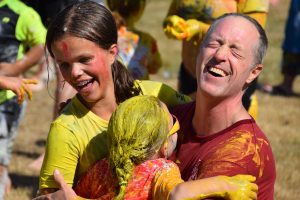
February 17, 2021 Psychology stats course partners with camp for kids with medical conditions
By Maegan Murray, WSU Tri-Cities
RICHLAND, Wash. – Data analysis from a Washington State University Tri-Cities psychology statistics course will be used to help Camp Korey, a camp for children with serious medical conditions, improve recruitment strategies and further refine camp programming to meet the needs of the children and families it serves amid COVID-19 and beyond.
The WSU Tri-Cities course, titled “Statistics in Psychology,” which is taught by associate psychology professor Janet Peters, partners each semester with a regional nonprofit to analyze data and turn it into useable sets of information. The opportunity not only allows students to use their developed knowledge of statistics, but also to learn more about the vast areas in which they can apply a career in psychology to help people and regional organizations, Peters said.
“When I first started doing service learning in my classes, the first question I asked was ‘How do I help students understand the power of the skills they are learning?’ ” she said. “The power of those skills become so much more apparent when you are helping somebody. That is what truly changes their perspective. They are learning for a purpose. When they see the benefits to their community, it changes the culture of the classroom.”
Peters was connected with Camp Korey through WSU’s Center for Civic Engagement Academic Program. The center works closely with faculty and instructors to integrate service learning into numerous courses across the WSU system, partnering for more than 1,500 opportunities.
“We see ourselves as a way to get students connected with off-campus engagement,” said Jessica Perone, faculty consultant with the WSU Center for Civic Engagement. “Janet participated in the 2017 Center for Civic Engagement Faculty Fellows program. Camp Korey was looking for some support with data analysis, and we were able to establish a great partnership with her WSU Tri-Cities class.”

A Camp Korey participant enjoys a summer activity. A WSU Tri-Cities psychology statistics course worked with Camp Korey to analyze data for use for the camp moving forward.
Changes amid COVID-19
Camp Korey provides year-round camp programs for children with life-altering medical conditions free of charge. It offers traditional summer camp activities, which are modified to meet their specific condition or circumstances. It also offers a year-round hospital outreach program known as “Camp to You,” which brings camp activities to children while they receive treatment in the hospital setting.
Kimberly Puhrmann, director of marketing and community engagement for Camp Korey, said in
a normal year, summer camp participants have the opportunity to partake in onsite activities ranging from horseback riding, to arts and crafts, to a special event called “Silly Olympics” where kids can fling paint, throw food and generally enjoy being a kid.
“This year, we had to creatively and quickly pivot our programming to a remote, virtual experience for campers and for our volunteers,” she said. “While we normally think of camp as an analog activity, in 2020, we found ways to blend analog fun in a digital experience as we strived to stay connected with our campers and community.”
From data to community action – all virtually
In groups, WSU Tri-Cities students collaboratively worked virtually to analyze data for a variety of factors, ranging from identifying camp participant sense of belonging, feelings of isolation, confidence levels, as well as general demographics. All factors were compared using data from before and amid the COVID-19 pandemic.
The students used Google Docs, Zoom and other digital platforms to communicate back and forth, keep track of their project progress, as well as complete their final reports detailing their analysis.
“Thankfully, we have technology that allows us to communicate,” psychology student Angelica Mendoza said. “We had to hold each other accountable and regularly have conversations about our work and progress.”
Analysis revealed that the camp was doing a great job in a variety of areas. For example, camp participants did not report feeling any more isolated in 2019 as compared to 2020 amid the pandemic, despite the switch to virtual offerings.
Analysis from other components revealed areas that could be further fine-tuned in their programming and supports. For example, female camp participants saw a decrease in continued participation from year to year after the age of 10, whereas male camp participants saw peak participation in their mid-teens. Stemming from research, the students indicated that one reason for the difference could be that male participants tend to participate more in outdoor activities than female participants for that age range.
“The data analysis and impactful insights provided by Dr. Peters and the psychology students will be instrumental when making future key decisions in the strategic planning of our camper programming, mission development and community outreach initiatives,” Puhrmann said.
She said the data will help the camp moving forward in identifying how they can best recruit and reach families with children with serious medical conditions, in validation for some of the things they are doing well, and for enhancing some of the programs and activities they provide to children and their families. It will also help them pursue further fundraising efforts and in the sharing of their brand and mission, she said.
“Our medical and program team will be using this, especially in looking at the social and emotional aspects of our programming,” she said.

Camp Korey participants enjoy a summer activity.
Rewards of applying course learning to community
Many WSU Tri-Cities students in the class said the opportunity to work with Camp Korey provided them with an extensive insight into the possibilities with psychology, gave meaning to their coursework, and made a course that can be intimidating much more approachable.
“I never would have expected to have had such an amazing experience in a statistics course, of all things,” Mendoza said. “(Peters) made me passionate about statistics because of the dedication she demonstrated to the material and to her students. The project only emphasized the importance of statistics to me and I wanted to show my newfound interest and appreciation for it through my work.”
Mendoza said working on the project with Camp Korey was one of the most rewarding experiences of her college career because of the service-based, real-world connection to what she was learning.
“Knowing that we were analyzing data for an organization like Camp Korey motivated us to stay dedicated to learning the material and produce quality work to be able to share with our community partners,” she said. “I personally felt so inspired by Camp Korey’s mission. This organization is devoted to allowing kids with serious medical conditions experience childhood. I am very grateful for this opportunity in collaborating with such an amazing cause.
Psychology student Jocelyn Martinez said it helped open her eyes to the world of research in psychology and the impact that it can have, regionally.
“My favorite aspects were analyzing their data and creating the final presentation,” she said. “It did open my eyes to research psychology, since I was leaning toward a career in clinical psychology. It helped me see that with research, I could learn more about different ways of treatment … It was very meaningful because a lot of times, you don’t have a lot of chances to work with nonprofits. It also helped me learn the material way better than I expected.”
The WSU Tri-Cities class will continue to work with Camp Korey this spring semester to analyze some alternative sets of data. The class is now examining data as it applies to diversity, equity and inclusion.
“The next wave of data will help guide and inform how we engage the process of recruitment for staff, volunteers and especially our campers and camp families,” Puhrmann said.
Holistic support from WSU
Peters’ class was one of several WSU classes and groups of students working to provide direct support for Camp Korey. One group created friendship bracelets for the campers. Other groups helped with creation of camper kits that were shipped out to camps participants, encouraging letters and painting rocks for use in beautifying the grounds.
“Being a WSU alumna, myself, this partnership has been incredibly rewarding,” Puhrmann said. “While this has been a challenging time for everyone, it is simply through the grit and determination of our community that Camp Korey continues to thrive. We are beyond grateful to WSU, the Center for Civic Engagement, Dr. Peters and the students for this opportunity and impactful partnership.”





